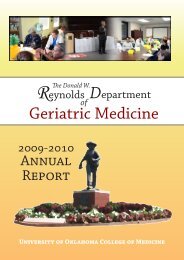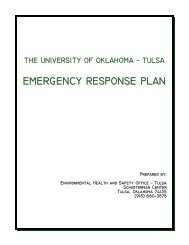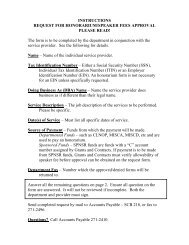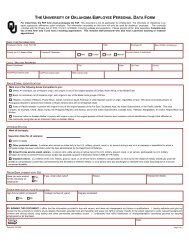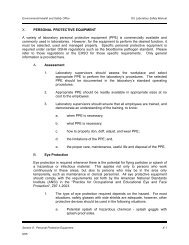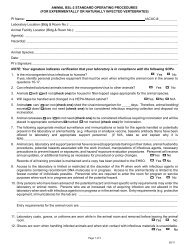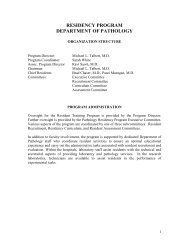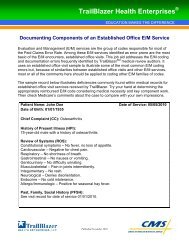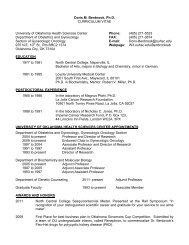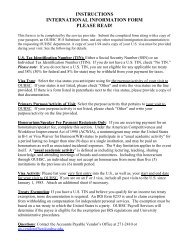The Unofficial Guide to First Year - University of Oklahoma Health ...
The Unofficial Guide to First Year - University of Oklahoma Health ...
The Unofficial Guide to First Year - University of Oklahoma Health ...
Create successful ePaper yourself
Turn your PDF publications into a flip-book with our unique Google optimized e-Paper software.
UNOFFICIAL GUIDE<br />
“What do you mean that’s not correct?!<br />
That was the most ideal submandibularfreakin-fossa<br />
I have ever seen!<br />
-Class <strong>of</strong> 2011 student after the Ana<strong>to</strong>my<br />
practical<br />
CHAPTER<br />
3<br />
Exam Review Committee<br />
WHAT IS IT?<br />
<strong>The</strong> Exam Review Committee (ERC) was set up <strong>to</strong> help facilitate the exam review process and <strong>to</strong><br />
bridge the communication between the students, as a class, and the faculty. This limits the number<br />
<strong>of</strong> students contacting pr<strong>of</strong>essors individually, <strong>of</strong>ten <strong>to</strong> discuss the same concerns over and over<br />
again and wasting a lot <strong>of</strong> time. Furthermore, not everyone is comfortable approaching a pr<strong>of</strong>essor<br />
with their concerns, and this system allows them <strong>to</strong> turn in appeals <strong>to</strong> a fellow student.<br />
WHO IS IT?<br />
Typically, the ERC consists <strong>of</strong> a chairperson (who is selected during student elections), and a<br />
committee <strong>of</strong> students representing the class. <strong>The</strong> members <strong>of</strong> this committee should be<br />
determined as soon as possible in the school year, if you decide <strong>to</strong> have a committee at all. You can<br />
have a standing committee or rotate responsibilities among people so that more people are able <strong>to</strong><br />
serve on the ERC. It’s up <strong>to</strong> the ERC chairperson <strong>to</strong> decide the system that works best.<br />
HOW DOES IT WORK?<br />
<strong>The</strong> way the ERC works is basically up <strong>to</strong> the members <strong>of</strong> the committee <strong>to</strong> decide each year, with<br />
the basic outcome that the chairperson and maybe a committee member meet with the pr<strong>of</strong>essor <strong>to</strong><br />
discuss the appeals. Here’s how the class <strong>of</strong> 2012 does it: <strong>The</strong> ERC chair oversees the review <strong>of</strong> all<br />
exams for every subject and all appeals must be turned in <strong>to</strong> him or her, usually via email. All<br />
concerns presented <strong>to</strong> the ERC must be accompanied by an explanation regarding the aspect <strong>of</strong> the<br />
test called in<strong>to</strong> question, along with the test form and question number. It is important <strong>to</strong> note<br />
that it is NOT the responsibility <strong>of</strong> the ERC <strong>to</strong> develop legitimate arguments <strong>to</strong> exam questions<br />
presented <strong>to</strong> the committee. However, it is extremely helpful so remember that when you are<br />
electing your ERC chair. It is the job <strong>of</strong> the ERC chairperson <strong>to</strong> set up appropriate meeting times<br />
with each <strong>of</strong> the course direc<strong>to</strong>rs <strong>to</strong> discuss such aspects <strong>of</strong> the test the committee has deemed<br />
worthy <strong>of</strong> presenting for review.<br />
A few words <strong>of</strong> advice… do not abuse this system or the pr<strong>of</strong>essors willing <strong>to</strong> participate in it. Much<br />
deliberation should occur before submitting questions <strong>to</strong> pr<strong>of</strong>essors for review. Submit only those<br />
concerns that the committee deems have legitimate arguments <strong>to</strong> them. All <strong>of</strong> the pr<strong>of</strong>essors want <strong>to</strong><br />
help us do well, but nobody likes <strong>to</strong> feel like they are being taken advantage <strong>of</strong>. Also, be careful about<br />
your postings on the discussion boards. Pr<strong>of</strong>essors read these and you don’t want <strong>to</strong> <strong>of</strong>fend any <strong>of</strong> them<br />
by making comments that seem <strong>to</strong> question their intelligence. Your class will undoubtedly discuss<br />
possibly flawed questions in the discussion boards, but try not <strong>to</strong> make it obvious that you are writing<br />
down questions on your answer sheets. Technically this is not allowed because the questions could be<br />
passed on <strong>to</strong> subsequent classes. But during the test if you feel a question is poorly worded or there is no<br />
correct answer- come back <strong>to</strong> it! Chances are you are not reading it correctly and you are tired from the<br />
40 pages <strong>of</strong> testing and/or 4 hours <strong>of</strong> sleep. Once you have returned <strong>to</strong> the question if you still feel it is in<br />
error, mark it on your answer sheet and jot down a word or two <strong>to</strong> jog your memory after the test. <strong>The</strong>n,<br />
once you have left the lecture hall, quickly write down what the heck you were thinking so you can email<br />
14




